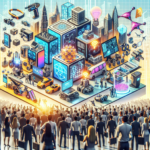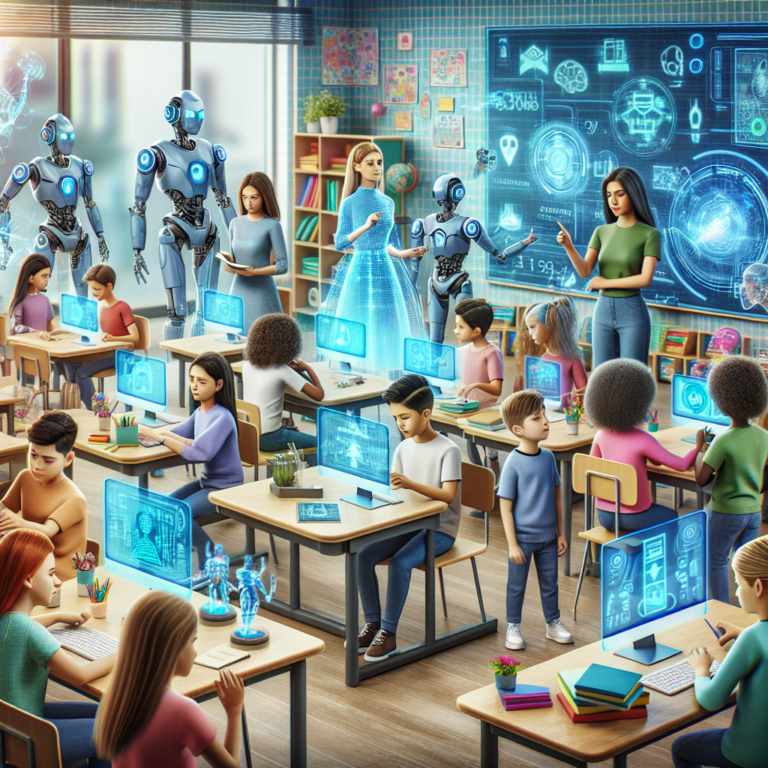AI in Education: Insights and Innovations for Enterprise Leaders
We’ve reached a pivotal moment where AI in Education is positioned to drive a groundbreaking transformation in how learning occurs. A recent initiative by the Arizona State Board for Charter Schools has approved Unbound Academy’s creation of an online school, which will utilize AI teaching assistants instead of traditional educators. This revolutionary approach is projected to encourage students to achieve 2.4 times the academic growth compared to standard educational methods.
This development symbolizes more than just another experiment with technology; it marks a significant milestone in the 60-year journey of Computer Assisted Instruction (CAI). Current trends indicate we are on the verge of remarkable advancements in educational technology, possibly making projects like Unbound Academy and others crucial to changing the game in learning environments.
Examining Innovations: Past vs. Present
The integration of computers into education began as far back as the 1950s, highlighted by the launch of PLATO (Programmed Logic for Automatic Teaching Operations) in 1961. PLATO provided immediate feedback and interactive lessons through terminals linked to a centralized computer network. Unfortunately, it ultimately succumbed to high costs, similar to numerous other time-sharing systems.
Another significant effort to create engaging educational experiences involved Second Life, where users interact as avatars in a virtual space. At its peak, over 300 universities, including prestigious institutions like Stanford and Harvard, utilized this platform for courses and research. Nevertheless, Second Life struggled due to its complicated interface, demanding technical resources, and scalability issues.
Leveraging AI Tools to Overcome Resource Limitations
The inception of generative AI in 2017 signified a crucial shift for CAI, introducing tools like Writable and Photomath that enhance both teaching and learning contexts. Writable harnesses AI to offer feedback on student writing, effectively reducing the workload for teachers. Reports indicate that Writable incorporates ChatGPT technology to generate teacher comments for consultation before being sent to students.
Such resources reveal AI’s fundamental role in addressing ongoing resource constraints in conventional education. For instance, in numerous U.S. school districts, class sizes exceed 40 students. A teacher spending 10 minutes on each student’s writing assignment results in more than 6.6 hours outside class solely to provide feedback for a single task. This scenario is impractical, especially when factoring in the need to assess other assignments. Thus, embracing AI solutions can critically alleviate these challenges.
AI-Enhanced Tutoring as a Scalable Alternative
The Khan Academy, founded by Sal Khan, has offered free online educational resources since 2008. Recently, in 2023, Khan Academy unveiled Khanmigo, an AI tutor powered by ChatGPT capabilities. During a recent TED Talk, Khan elaborated on Khanmigo’s potential to influence student learning outcomes positively.
Khan referenced a groundbreaking 1984 paper titled “The 2 Sigma Problem” by Professor Benjamin Bloom, which suggested that students receiving personalized tutoring performed significantly better than those limited to conventional classroom instruction. However, Bloom recognized the impracticality of achieving personalized tutoring on a large scale due to resource constraints, such as hiring human tutors. He advocated for more affordable solutions that could deliver similar benefits to individualized tutoring.
Sal Khan believes AI-driven tools, like Khanmigo, effectively bridge these resource gaps. According to a Harvard Business School case study, Khan described Khanmigo as the “holy grail” of educational technology—a tool that mimics the assistance of a human tutor.
Balancing Efficiency with Human Connection
While AI tools have tremendous potential to address resource issues, their integration introduces critical questions about the necessity of human interaction within the learning process. At Unbound Academy, students will participate in two hours of online sessions daily, engaging with AI-driven lessons covering math, reading, and science. Tools like Khanmigo and IXL will customize the curriculum, continually assessing student progress to adjust content and challenge levels in real time.
This strategy aims to maintain each student’s engagement, minimizing feelings of boredom or frustration. However, the model at Unbound Academy notably limits students’ contact with human instructors, as human “guides” provide emotional support and conduct workshops focusing on life skills. This raises concerns regarding what students might miss out on by predominantly interacting with AI rather than traditional educators. There are also questions about how this novel model could redefine the teaching profession.
Currently operational in various private schools, Unbound Academy has yielded results supporting its claimed benefits. Yet, it remains uncertain how this technology-centered approach will affect students’ ability to develop human relationships outside standard educational environments. These issues highlight the challenging balance organizations like Unbound Academy must achieve as they navigate the evolving educational landscape.
The AI-Driven Educational Revolution
Unbound Academy is just one example of AI’s integration within educational frameworks. Khanmigo is being trialed in 266 school districts across the U.S. for students in grades three through twelve. This pilot showcases how AI can fit into traditional educational settings, assisting both teachers and students by streamlining lesson planning, saving time, and delivering real-time insights regarding student achievements.
Over the past 60 years, CAI has made considerable strides since the days of PLATO. Should AI-centric educational models succeed, they could democratize access to quality education. However, while there is potential for AI to exacerbate existing disparities, it simultaneously presents unparalleled opportunities to bring quality learning experiences to underserved communities.
As institutions like Unbound Academy and those exploring Khanmigo advance towards AI-supported education techniques, they challenge long-standing beliefs about learning and the indispensable role of human instruction. The implications of these innovative explorations could significantly shape education for generations to come. 📚✨




0 Comments